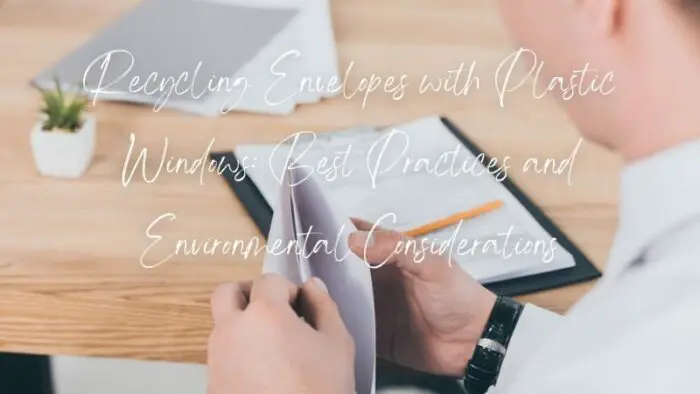It is generally not recommended to recycle envelopes with plastic windows. The plastic window is not easily separable from the paper envelope and can contaminate the recycling process. It is best to dispose of envelopes with plastic windows in the trash.
You can usually do so if you want to recycle envelopes without plastic windows. Envelopes without plastic windows can be recycled along with other paper products, such as newspaper, cardboard, and office paper.
To recycle envelopes, remove any plastic or metal components, such as staples or paper clips, and ensure the envelope is clean and dry. You can recycle the envelope and other paper products in your curbside recycling bin or at a local recycling center.
It is always a good idea to check with your local recycling center or waste management provider for specific guidelines on what can and cannot be recycled in your area.
What Happens to Envelopes in the Landfill?
When envelopes and other paper products are sent to a landfill, they decompose over time, breaking them into smaller pieces. The decomposition process can take several years, depending on the conditions in the landfill and the type of paper being disposed of.
During the decomposition process, microorganisms in the landfill consume the organic matter in the envelopes, producing methane, a potent greenhouse gas. Methane is a significant contributor to climate change, so reducing the methane produced in landfills is a significant environmental concern.
One way to reduce the environmental impact of landfills is to recycle paper products, such as envelopes, instead of sending them to landfill. Recycling paper conserves natural resources, reduces the amount of methane produced in landfills, and reduces the overall volume of waste that needs to be disposed of in landfills.

How Long Will the Plastic Window Last?
Plastic can take hundreds of years to break down in a landfill. The exact amount of time it takes for a plastic window in an envelope to decompose in a landfill will depend on a variety of factors, including the specific type of plastic used, the conditions in the landfill (such as temperature, humidity, and the presence of microorganisms), and the thickness and size of the plastic window.
Plastic takes much longer to decompose than organic materials such as paper and food waste. While the paper envelope may break down over several years in a landfill, the plastic window will remain largely intact. This can contribute to the overall volume of waste in the landfill and can have negative environmental consequences, such as the production of methane, a potent greenhouse gas.
Recycling paper products, including envelopes, is essential whenever possible to reduce the environmental impact of landfills and conserve natural resources. Recycling paper saves energy and raw materials, reduces greenhouse gas emissions, and reduces the overall volume of waste that needs to be disposed of in landfills.
Alternatives to Plastic Window Envelopes
There are several alternatives to plastic window envelopes that are more environmentally friendly:
- Kraft paper envelopes: These are made from recycled paper and are biodegradable. They are also inexpensive and widely available.
- Envelopes made from recycled materials: Many companies now offer envelopes made from recycled paper or recycled plastic. These options reduce the demand for new materials and have a lower environmental impact.
- Envelopes with cellulose windows: Cellulose windows are made from plant-based materials, such as wood pulp, and are biodegradable. They are a more sustainable option compared to plastic windows.
- Envelopes with no windows: If you don’t need to see the address on the letter or document inside, you can opt for envelopes with no windows. This eliminates the need for plastic windows and reduces the environmental impact.
- Digital alternatives: In some cases, it may be possible to eliminate the need for physical envelopes by sending documents and letters electronically. This can save resources and reduce waste.
Creative Ideas for Reusing Plastic Window Envelopes
Here are a few creative ideas for reusing plastic window envelopes:
- Use them as packing materials when shipping items. The plastic window can help identify what is inside the package.
- Turn them into storage bags for small items, such as beads, buttons, or craft supplies.
- Use them to organize paperwork, such as bills and receipts.
- Cut them up and use them as bookmarks.
- Use them as protective sleeves for essential documents, such as passports or certificates.
- Donate them to schools or community organizations that can use them for projects or crafts.
- Use them to create envelopes for homemade greeting cards or invitations.
- Use them as a template to make your envelopes out of paper or fabric.
- Repurpose them as small trash bags for your car or home.
- Use them to keep track of seeds or plant labels in the garden.
Conclusion
Envelopes with plastic windows should not be recycled because the plastic window is not easily separable from the paper envelope and can contaminate the recycling process. It is best to dispose of envelopes with plastic windows in the trash. Envelopes without plastic windows can usually be recycled along with other paper products, such as newspaper, cardboard, and office paper.
When paper products, such as envelopes, are sent to a landfill, they decompose over time, but the plastic window will remain largely intact for hundreds of years. Recycling paper products, including envelopes, conserves natural resources, reduces greenhouse gas emissions, and reduces the overall volume of waste that needs to be disposed of in landfills.

